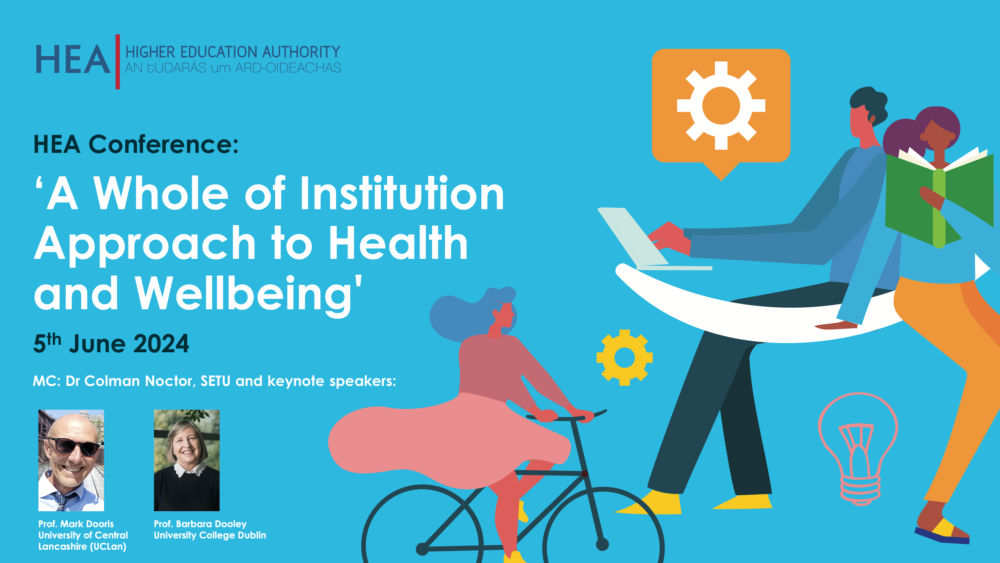The HEA will today (June 5th) host the 2nd National Health and Wellbeing Conference, ‘A Whole of Institution Approach to Health and Wellbeing’
The conference aims to bring together leadership and staff across the higher education sector working on the implementation of the HEA Healthy Campus Charter and Framework and the National Student Mental Health and Suicide Prevention Framework.
Experts in campus health & wellbeing, mental health, health promotion and suicide prevention will share insights and provide guidance on effective implementation of these frameworks. Keynote speakers include Professor Mark Dooris, Emeritus Professor in Health & Sustainability at the University of Central Lancashire presenting on ‘Healthy Campuses: Mobilising for the Future Wellbeing of People, Places & Planet’ and Professor Barbara Dooley, Dean of Graduate Studies and Professor of Psychology at University College Dublin on ‘The complexity of student mental health: risk and protective factors’.
As part of the conference over 25 Healthy Campus Case Studies will be showcased. These case studies are submitted by institutions and topics include mental health awareness campaigns, health and wellbeing on the curriculum, research into the health behaviours of students and staff, a food pantry and more.
A key part of the day will be highlighting the importance of a whole of institution’s approach to health and wellbeing, where health and wellbeing is not seen as the role of a few staff or services but of everyone’s role. We know that the health and wellbeing of students and staff is linked to the broader objectives of higher education.
Dr Alan Wall, CEO said:
‘The HEA is committed to advancing the wellbeing agenda and acknowledges the important role it plays in relation to student success and broader objectives of higher education. The 2024 conference marks an important event for student and staff health and wellbeing across the higher education sector and I encourage the continued commitment of leadership working to advance the whole of institution approach required for successful outcomes’.
National Healthy Campus Coordinator, Caroline Mahon commented:
‘In February this year the HEA held a student progression conference with key stakeholders across the system. The discussion on student progression centered around the broader context of student success, with student health and wellbeing emerging as a key theme. Today’s conference aims to highlight good practice, momentum, and aspirations across the sector in creating institutions with learning environments and organisational cultures that support health and wellbeing, enabling students and staff to reach their full potential and flourish.’
Notes to the editor
- A series of lightning talks will also be presented from a broad range of stakeholders across the sector and will cover topics such as curriculum and student success and the evidence on implementing student mental health initiatives.
- The HEA sees work in the area of health and wellbeing as a key contributor to student success and supports continued commitment by higher education institutions in creating a learning environment and organisational culture that enhances the health and wellbeing of the campus community and enables students and staff to achieve their full potential.
- Both the HEA Healthy Campus Charter and Framework and the National Student Mental Health and Suicide Prevention Framework provide important policy guidance in student and staff health and wellbeing, including suicide prevention, services, interventions and health promotion. Important to both is the need for genuine and committed whole campus approaches across our institutions.
- Higher education offers enormous potential to impact positively on the health and wellbeing of students, staff and the wider community through teaching and learning, research, knowledge exchange, institutional practice and culture.
- The National Student Mental Health and Suicide Prevention Framework was developed as part of the Higher Education Authority’s commitment to playing its part within the wider context of the Department of Health’s Connecting for Life – Ireland’s National Strategy to Reduce Suicide 2015-2020. Since 2020 the HEA has allocated €20.9 million to student mental health support in higher education institutions.
- In 2022, the HEA officially took over the implementation of the Healthy Campus Charter and Framework, in partnership with the Department of Health. The Framework was co-created, through a consultative process, by Higher Education Institutions, the Department of Health and the HSE. The International Okanagan Charter with two clear calls to action: 1. Embed health into all aspects of campus culture, across the administration, operations and academic mandates. 2. Lead health promotion action and collaboration locally and globally. Mobilising the Charter Internationally is the International Health Promoting Universities and Colleges, Ireland through the HEA and the National Coordinator are represented on this group.
- This formed the basis for the definition of a Healthy Campus in an Irish context where ‘A Healthy Campus adopts a holistic understanding of health, takes a whole campus approach and aspires to create a learning environment and organisational culture that enhances the health and wellbeing of its community and enables people to achieve their full potential.
- Ireland, through the HEA, is represented on the International Health Promoting Campuses Network. The University of Limerick in collaboration with ATU was successfully awarded a bid to host the International Health Promoting Campuses Conference in 2025. The 2025 conference will see a renewal of the Okanagan Charter with representatives from across the globe including Canada, America, Australia, India, Singapore, UK, Africa and many more.

